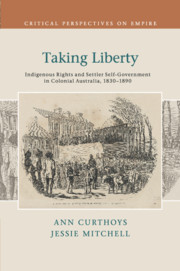Book contents
- Taking Liberty
- Critical Perspectives on Empire
- Taking Liberty
- Copyright page
- Contents
- Abbreviations
- Acknowledgements
- Maps
- Introduction
- Part I A Four-Cornered Contest: British Government, Settlers, Missionaries, and Indigenous Peoples
- Part II Towards Self-Government
- Part III Self-Governing Colonies and Indigenous People, 1856–c.1870
- 10 Ghosts of the Past, People of the Present: Tasmania
- 11 ‘A Refugee in Our Own Land’
- 12 Aboriginal Survival in New South Wales
- 13 Their Worst Fears Realised
- 14 A Question of Honour in the Colony That Was Meant to Be Different
- Part IV Self-Government for Western Australia
- Conclusion
- Index
10 - Ghosts of the Past, People of the Present: Tasmania
from Part III - Self-Governing Colonies and Indigenous People, 1856–c.1870
Published online by Cambridge University Press: 28 September 2018
- Taking Liberty
- Critical Perspectives on Empire
- Taking Liberty
- Copyright page
- Contents
- Abbreviations
- Acknowledgements
- Maps
- Introduction
- Part I A Four-Cornered Contest: British Government, Settlers, Missionaries, and Indigenous Peoples
- Part II Towards Self-Government
- Part III Self-Governing Colonies and Indigenous People, 1856–c.1870
- 10 Ghosts of the Past, People of the Present: Tasmania
- 11 ‘A Refugee in Our Own Land’
- 12 Aboriginal Survival in New South Wales
- 13 Their Worst Fears Realised
- 14 A Question of Honour in the Colony That Was Meant to Be Different
- Part IV Self-Government for Western Australia
- Conclusion
- Index
Summary
- Type
- Chapter
- Information
- Taking LibertyIndigenous Rights and Settler Self-Government in Colonial Australia, 1830–1890, pp. 255 - 268Publisher: Cambridge University PressPrint publication year: 2018



